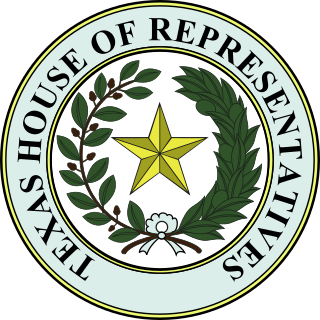
Samuel Taliaferro Rayburn was an American politician who served as the 43rd speaker of the United States House of Representatives. He was a three-time House speaker, former House majority leader, two-time House minority leader, and a 24-term congressman, representing Texas's 4th congressional district as a Democrat from 1913 to 1961. He holds the record for the longest tenure as Speaker of the United States House of Representatives, serving for over 17 years.

The California State Assembly is the lower house of the California State Legislature, the upper house being the California State Senate. The Assembly convenes, along with the State Senate, at the California State Capitol in Sacramento.

The Texas House of Representatives is the lower house of the bicameral Texas Legislature. It consists of 150 members who are elected from single-member districts for two-year terms. There are no term limits. The House meets at the State Capitol in Austin.

The Michigan House of Representatives is the lower house of the Michigan Legislature. There are 110 members, each of whom is elected from constituencies having approximately 77,000 to 91,000 residents, based on population figures from the 2020 U.S. census. Its composition, powers and duties are established in Article IV of the Michigan Constitution.

James Manuel Costa is an American politician serving as the U.S. representative for California's 21st congressional district since 2023, previously representing the 20th congressional district from 2005 to 2013 and the 16th congressional district from 2013 to 2023. A member of the Democratic Party, his district includes most of Fresno.

The 1994 United States House of Representatives elections were held on November 8, 1994, to elect U.S. Representatives to serve in the 104th United States Congress. They occurred in the middle of President Bill Clinton's first term. In what was known as the Republican Revolution, a 54-seat swing in membership from the Democratic Party to the Republican Party resulted in the latter gaining a majority of seats in the House of Representatives for the first time since 1952. It was also the largest seat gain for the party since 1946, and the largest for either party since 1948, and characterized a political realignment in American politics.

Irving McNeil Ives was an American politician and founding dean of the Cornell University School of Industrial and Labor Relations. A Republican, he served as a United States Senator from New York from 1947 to 1959. He was previously a member of the New York State Assembly for sixteen years, serving as Minority Leader (1935), Speaker (1936), and Majority Leader (1937–1946). A liberal Republican, he was known as a specialist in labor and civil rights legislation. Ives voted in favor of the Civil Rights Act of 1957.

The leader of the Australian Labor Party is the highest political office within the federal Australian Labor Party (ALP). Leaders of the party are chosen from among the sitting members of the parliamentary caucus either by members alone or with a vote of the party’s rank-and-file membership. The current leader of the Labor Party, since 2019, is Anthony Albanese, who has served as the prime minister of Australia since 2022. There have been 21 leaders since 1901 when Chris Watson was elected as the inaugural leader following the first federal election.
This is a list of award winners and league leaders for the Cleveland Guardians of Major League Baseball.
The California Republican Party (CAGOP) is the affiliate of the United States Republican Party in the U.S. state of California. The party is based in Sacramento and is led by chair Jessica Millan Patterson, the first Latina to lead the party.

James Willys Silliman was a Republican politician from the US State of California, who served in the California State Assembly for the 33rd and 34th district from 1947 to 1955, including serving as Speaker of the Assembly from 1953 to 1954. He ran unsuccessfully for lieutenant governor in 1954 and for state senator in 1955.

The Oklahoma House of Representatives is the lower house of the legislature of the U.S. state of Oklahoma. Its members introduce and vote on bills and resolutions, provide legislative oversight for state agencies, and help to craft the state's budget. The upper house of the Oklahoma Legislature is the Oklahoma Senate.

The Iowa House of Representatives is the lower house of the Iowa General Assembly, the upper house being the Iowa Senate. There are 100 seats in the Iowa House of Representatives, representing 100 single-member districts across the state, formed by dividing the 50 Senate districts in half. Each district has a population of approximately 30,464 as of the 2010 United States Census. The House of Representatives meets at the Iowa State Capitol in Des Moines.

Paul Joseph Cook is an American politician serving as a San Bernardino County Supervisor since 2020, previously serving as the U.S. representative for California's 8th congressional district from 2013 to 2020. A member of the Republican Party, Cook also served on the Yucca Valley Town Council from 1998 to 2006 and represented the 65th district in the California State Assembly from 2006 to 2012.
Oswald David Heck was an American lawyer and politician. To date he has been the longest-serving Speaker of the New York State Assembly, and he was the last Speaker from Upstate New York.
The Wisconsin Progressive Party (1934–1946) was a political party that briefly held a dominant role in Wisconsin politics.

The 1886–87 United States Senate elections were held on various dates in various states. As these U.S. Senate elections were prior to the ratification of the Seventeenth Amendment in 1913, senators were chosen by state legislatures. Senators were elected over a wide range of time throughout 1886 and 1887, and a seat may have been filled months late or remained vacant due to legislative deadlock. In these elections, terms were up for the senators in Class 1.

James M. "Jamie" Gallagher is an American politician currently serving in the California State Assembly. He represents the Assembly District #3, located in the northern Sacramento Valley. As of February 8, 2022, he was voted by the Assembly Republican Caucus as the Minority Leader of the California State Assembly.
Kenneth Cromwell Hand was an American Republican Party politician and judge who served in the New Jersey State Senate. He was a candidate for the 1953 Republican nomination for Governor of New Jersey.
Samuel Lauderdale Park is an American politician and lawyer, who was elected to the Georgia House of Representatives in the 2016 elections. A member of the Democratic Party, he represents the 107th district.














